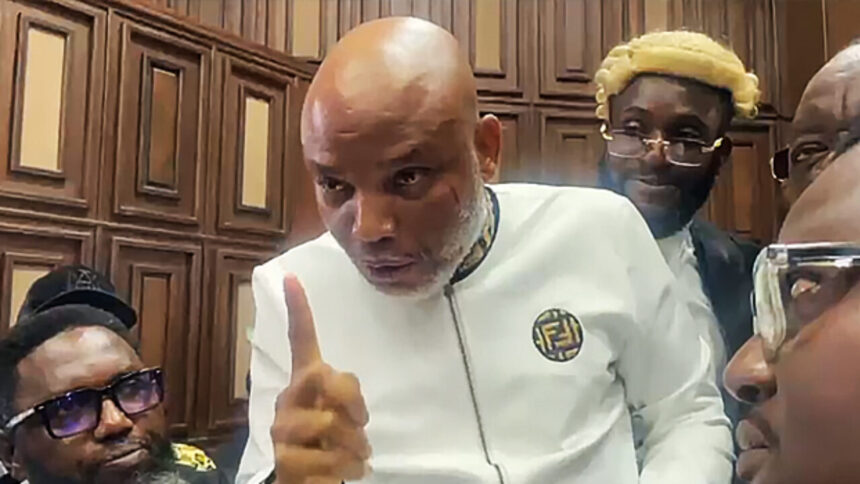-
IPOB Leader Nnamdi Kanu Seeks Dismissal of All Charges, Demands Immediate Release
-
Motion argues current charges are “nullity ab initio” due to reliance on repealed laws
-
Kanu contends Nigerian courts lack jurisdiction over alleged acts in Kenya
The detained leader of the Indigenous People of Biafra (IPOB), Mazi Nnamdi Kanu, has filed a fresh motion at the Federal High Court in Abuja, seeking the dismissal of all charges against him and his immediate release.
In the motion dated October 30, 2025, titled “Motion on Notice and Written Address in Support”, Kanu contended that the charges before the court have no legal foundation, describing them as “a nullity ab initio for want of any extant legal foundation.”
ATTENTION: Click “HERE” to join our WhatsApp group and receive News updates directly on your WhatsApp!
READ ALSO: Nnamdi Kanu Shocks Court, Drops Plan to Call Witnesses in Terrorism Trial
Representing himself, the IPOB leader filed the motion under Sections 1(3), 6(6)(b), and 36(12) of the 1999 Constitution, the Evidence Act 2011, and the Terrorism (Prevention and Prohibition) Act 2022. He argued that the prosecution relied on repealed laws, including the Customs and Excise Management Act (CEMA), repealed by the Nigeria Customs Service Act 2023, and the Terrorism Prevention (Amendment) Act 2013, repealed by the TPPA 2022.
Kanu asserted that reliance on these laws violates Section 36(12) of the Constitution, which prohibits trials for offences not defined under current law. He therefore asked the court to strike out all charges, insisting they do not constitute any offence recognized by law.
Citing the Supreme Court ruling in FRN v. Kanu (SC/CR/1361/2022), he argued that courts are bound to take judicial notice of repealed laws under Section 122 of the Evidence Act 2011, warning that failure to do so renders proceedings null and void.
The IPOB leader further argued that some counts allegedly occurred in Kenya, violating Section 76(1)(d)(iii) of the TPPA 2022, which requires validation by a Kenyan court before Nigerian courts can try such offences.
He also invoked Article 7(2) of the African Charter on Human and Peoples’ Rights, claiming the court’s extraterritorial jurisdiction is invalid.
Kanu referenced past decisions, including Aoko v. Fagbemi (1961) 1 All NLR 400 and FRN v. Ifegwu (2003) 15 NWLR (Pt 842) 113, where convictions based on non-existent laws were nullified.
He asked the court to direct the prosecution to respond strictly on points of law within three days and to deliver a ruling on or before November 4, 2025, noting that his application raises only constitutional and legal questions and therefore does not require an affidavit.

